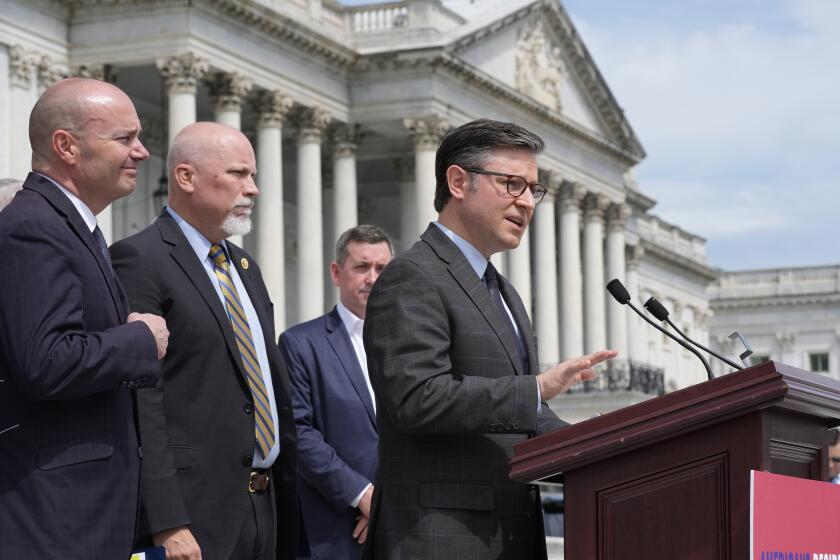Kerry Wants to End Tax Break for Corporate Profits Abroad
Democratic presidential candidate John F. Kerry today will call for ending a tax benefit he says encourages companies to shift operations abroad, and propose using the anticipated savings to encourage job creation at home, according to a copy of the plan provided to The Times.
The proposal, which Kerry is scheduled to make public in Detroit, helps flesh out two of his main campaign promises: accelerating job growth in the United States and cracking down on companies that shift operations abroad.
But even some experts who liked the plan said they were dubious it would significantly affect company decisions about where to locate new facilities.
President Bush has charged that Kerry will push for large tax increases as president, an assertion reiterated in a Bush advertisement unveiled Thursday. Kerry aides said the candidate’s new proposal would cut taxes for virtually all U.S. companies because the savings from eliminating the existing tax benefit would be applied toward new tax breaks for business.
“It gives 99% of businesses a tax cut, and it takes away incentives to create jobs overseas,” said Gene Sperling, a former top advisor to President Clinton who helped the Massachusetts senator develop the plan.
Terry Holt, a spokesman for the Bush campaign, dismissed the proposal as “tinkering with the tax code.” He also said it did not answer how Kerry would finance new spending he has proposed -- which the Bush campaign claimed totals $1.7 trillion over 10 years.
The speech scheduled for today is the first of three that aides say will expand Kerry’s agenda for reversing the economy’s loss of more than 2 million jobs since Bush took office.
For his opening salvo, Kerry has focused on a relatively obscure and complex provision of federal tax law.
Currently, American companies operating abroad do not have to pay U.S. taxes on foreign profits if they continue to invest the money abroad. In those cases, the companies have to pay only the taxes levied by the country in which they are operating.
Critics say that provision encourages American companies to shift employment toward countries with lower taxes.
Kerry would rescind that tax break in almost all cases, taxing companies on the overseas profits remaining after they paid taxes to foreign governments. His camp estimates that will bring in $12 billion annually.
He would seek to raise more money by providing companies operating abroad with a one-year “tax holiday,” under which they could reinvest in the United States their built-up profits from foreign facilities at a temporary low tax rate of 10%.
Kerry would use the revenue generated by his plan to fund two new business tax breaks.
He would reduce the corporate income tax rate for all U.S. companies from 35% to 33.25%. He also would provide a tax credit to owners of small businesses and manufacturers who hired more workers. The credit would cover the employer’s share of payroll taxes for the new workers.
“It’s hard to quantify what a single reform like this would do, but one can assume it would [produce] a significant number of jobs,” Sperling said
But others were not so sure the effects would be that significant, partly because the change would affect companies only locating in countries with lower tax rates than the United States, such as Ireland or Singapore. Joel Slemrod, an international tax expert at the University of Michigan Business School, praised the idea as a sensible effort “to eliminate any tax incentives for multinationals to produce abroad rather than in the U.S.”
But he added that the change in tax incentives probably would not be large enough to overcome other factors encouraging companies to shift employment abroad, such as lower wages. “To those who see [outsourcing] as a problem, this is not a solution,” he said.
More to Read
Get the L.A. Times Politics newsletter
Deeply reported insights into legislation, politics and policy from Sacramento, Washington and beyond. In your inbox three times per week.
You may occasionally receive promotional content from the Los Angeles Times.






